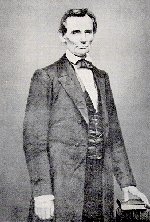 |
| John A. Gilmer of North Carolina |
The text of Gilmer's letter can be found on the Library of Congress website.
 |
| Abraham Lincoln |
|
John
Adams Gilmer (1805--1868) was a North Carolina politician.
Originally a Whig, he was elected to two terms in Congress,
serving from March
of 1857 to March of 1861. A moderate on many issues, he was
spoken of as a possible member of President Lincoln's cabinet, but it
is unclear if a firm offer was ever made, and he followed his state
into the Confederacy when it seceded, even serving in the Confederate
Congress. He wrote the following letter to President-elect
Lincoln in December of 1860; Lincoln's reply, which might be
characterized as evasive, dated
December 15, 1860, is in the
Collected Works of Lincoln, here. The text of Gilmer's letter can be found on the Library of Congress website. |
|
|
House of Reps. U. S. December 10th 1860 Mr Lincoln. The present perilous condition of the Country---threatening the destruction of the Union---must be my excuse for the unusual liberty I take in writing this letter. Solicitous that the States may remain united, if by any fair means possible, and the honor and constitutional rights of all maintained and secured; and desirous to do all I can to preserve the public peace, I venture to express the hope that you may feel at liberty, in advance of your installation, to give the people of the United States the views and opinions you now entertain on certain political questions which now so seriously distract the country. For one politically opposed to you, and representing a Southern constituency, who, together with myself, did all we could (I trust honorably) to defeat your election, I feel that I presume a great deal, perhaps too much in troubling you with any inquiries. But the dangers of the crisis, and my desire to have allayed, if possible, the apprehensions of real danger and harm to them and their peculiar institution which have seized the people of my section, I respectfully ask whether as, President you will favor the abolition of Slavery in the District of Columbia: 2d Whether you would approve of any law of Congress prohibiting the employment of Slaves in the Arsenals and Dock Yards where their location is in the Slave States; -- or the transfer of slaves from one slave holding State or Territory to another of like character:-- 3d Whether, in your opinion, Congress has the power, directly or indirectly to interfere with slavery in the States; and whether by any policy, or any system of appointment to office, Slavery agitation, or by other ways or means, you would in any way, directly or indirectly, attempt to lessen the value and usefulness of Slaves;---disturb the peace and quiet of their owners, or impair the institution of Slavery:-- 4th Whether, on the application of any new State for admission into the Union, you would veto an act of Congress admitting the same because slavery was tolerated in her constitution ---the same being the choice and fairly expressed will of the citizens making the application:---also indicate the policy, if any, which you would favor or recommend to settle and quiet the disturbing question of Slavery in the Territories:-- 5th Whether you will enforce the fugitive slave law-- whether you would favor its repeal. If not, whether you would suggest amendments impairing its efficiency or usefulness:-- 6th Whether you will use the influence of your position to secure the repeal of all laws passed by any state, in conflict with the fugitive slave law and intended to defeat its peaceful and proper execution. I address you from pure motives.---The times are alarming, and fully justify your speaking on the question mentioned now. You have in some degree my opinion of the excitement in my section, when I assure you that you hazard less to yourself, politically, in granting a request which I earnestly press solely for the sake of good, than I do in making it. But I am not without hope that a clear and definite exposition of your views on the questions mentioned may go far to quiet, if not satisfy all reasonable minds, that on most of them it will become plain that there is more misunderstanding than difference, and that the balance are so much more abstract than useful or practical; that as to them a generous and patriotic yielding on the part of your section, now so largely in the majority, would, on the one hand, be a mere sacrifice of opinion, and, on the other, the preservation of the best Government that has ever fallen to the lot of any people. Respectfully, Your obt servt. John A. Gilmer
|